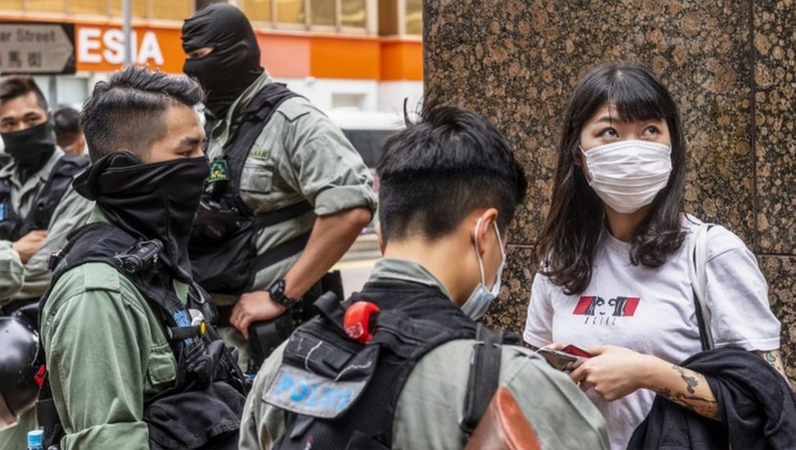Boris Johnson offers refuges, U.K. citizenship path for nearly 3 million Hong Kong residents

HONG KONG - British Prime Minister Boris Johnson pledged Wednesday to overhaul immigration rules to grant almost three million Hong Kong residents a pathway to British citizenship, a response to Beijing's move to impose a far-reaching security law here that many fear will dismantle the city's political freedoms.
Johnson's vow comes as the United States, Canada, Australia and others face pressure from lawmakers and human rights groups to offer residency to Hong Kong people fleeing deteriorating political circumstances in the former British colony, which was promised a high degree of autonomy under the terms of its 1997 handover to China.
London's move, which Johnson said he would implement when China formally enacts the security law, could emerge as among the most significant ramifications of Beijing's effort to undercut Hong Kong's freedoms and bring the city more closely under the Communist Party's authoritarian rule. It would potentially grant British residency and working rights to up to 40% of Hong Kong's population, raising the specter of a brain drain from the Asian financial center.
In op-eds published in the South China Morning Post and the Times of London, Johnson said the Chinese security law - which will criminalize broadly worded offenses such as secession, subversion and foreign interference - gives Britain "no choice but to uphold our profound ties of history and friendship with the people of Hong Kong."
Specifics of the new law are scant, but the approved proposal will allow Chinese security forces to operate in Hong Kong for the first time, enabling them to crush dissent as they do on the Chinese mainland. Hong Kong has been rocked in recent times by widespread protests calling for greater democracy and opposing Beijing's tightening grip.
Johnson wrote that his government would allow holders of British National Overseas, or BNO, passports to come to Britain for a renewable period of 12 months and gain the right to work. The move "could place them on a route to citizenship," he said.
These passports, a holdover from British colonial rule issued to people born before 1997, currently allow holders to stay in Britain for six months but do not afford them work rights or residency. About 350,000 people in Hong Kong hold these passports but an additional 2.5 million are eligible.
Chinese Foreign Ministry spokesman Zhao Lijian said last week, when the changes were first floated by British Foreign Secretary Dominic Raab, that Beijing would consider any changes to the status of BNO passport holders a breach of "international law and basic norms guiding international relations."
"We firmly oppose this and reserve the right to take corresponding measures," Zhao said, adding that Hong Kong's affairs were an internal matter for China.
Hong Kong's government declined to comment Wednesday and referred The Washington Post to statements by China's Foreign Ministry.
Lawmakers in other Western countries have issued similar calls to offer refuge to people fleeing the crackdown in Hong Kong, though the BNO passports give Britain a relatively easy route to welcome residents of the territory. This week, Senate Majority Leader Mitch McConnell, R-Ky., said the U.S. response should "mirror those of other democracies who have opened their doors to Hong Kongers fleeing oppression."
"Our nation has a rich heritage of standing as a beacon of light and freedom, from refugees of war to those escaping the Iron Curtain," he said. "We should exercise it again for the people of Hong Kong."
President Tsai Ing-wen of Taiwan has said her government is also working on measures to allow Hong Kongers to move to the self-governed democracy to live and work.
President Donald Trump last week said the United States would begin the process of revoking Hong Kong's special status under U.S. law after the State Department determined that the territory no longer enjoyed autonomy within China.
Hong Kong protesters have repeatedly demonstrated outside the British consulate here, and have pressed the British government to allow BNO passport holders a pathway to full citizenship. Since China announced it was imposing the security law by fiat, bypassing Hong Kong's legislature, dozens have flocked to renew those documents, local media reported.
Still, some on Wednesday expressed skepticism about leaving, daunted by the prospect of navigating life in Britain.
"The unemployment rate in the U.K. is high," said Ken Chong, a 30-year-old BNO passport holder who works at a bank in Hong Kong. "I'm not sure it will make a big difference for BNO holders, but as long as they are pressuring the Chinese government, then that's a good move."
Wayne Ma, a social media editor in Hong Kong, said he would not consider moving to Britain because he couldn't afford to live there.
"I wouldn't count on Britain to save Hong Kong, I think it is unable to even fend for itself," he said.
